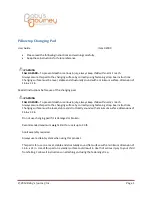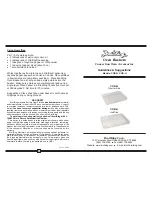
MSI-3750 Digital Weight Indicator
◆
User Guide
Page 43
M E A S U R E M E N T S Y S T E M S I N T E R N A T I O N A L
DEFINITIONS AND FORMULAS
AVERAGE – is computed by dividing the total by the number of samples.
MIN – is a single weight register that records the minimum weighment that was
added to the total.
MAX– is a single weight register that records the maximum weighment that was
added to the total.
STANDARD DEVIATION – is a measure of how widely values are dispersed
from the average value (the mean). The 3750 uses the “non-biased” or “n-1”
method that is based on sampling a portion of each available weighment.
Standard Deviation uses the following formula where x is equal to the total, and
n is equal to the number of samples.
n
x
x
n n
2
2
1
∑
∑
−
( )
−
(
)
COEFFICIENT OF VARIANCE – is a relative dispersion calculated from the
sample standard deviation and the mean with the following formula:
100 StdDev
Average
(
)
%
GRAND TOTAL – is computed by adding together the totals of all the ID Codes
(adjusted to the default unit set in calibration if necessary).
GRAND AVERAGE – is computed by dividing the Grand Total by the number
of samples of all the ID Codes.
Units and the Statistics Registers
Due to the mathematical interaction of the Statistics Registers, only one unit (lb,
kg, etc.) is available across all the ID Codes. So unlike standard ID Codes
without statistics, once a total has been taken in any ID Code the units function
is locked. The only way to change units is to clear the registers using the
CLEAR ALL TOTALS (SETUP VIEW TOTAL) procedure detailed in the Total
Section. Once all the total and statistics registers are cleared, the units can be
changed.
Summary of Contents for MSI-3750
Page 145: ......
















































